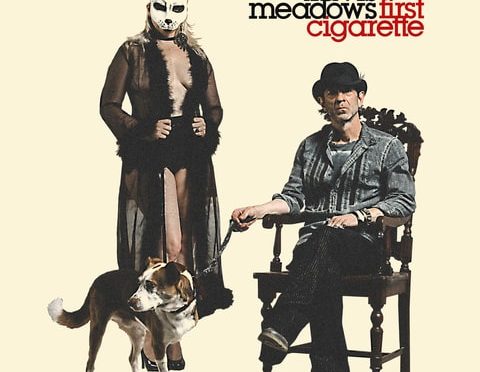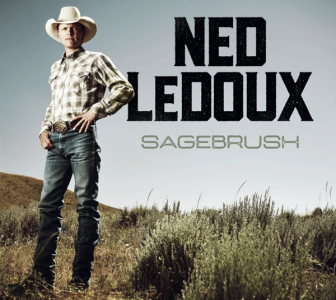Rating: 8/10
Travis Meadows adds his name to the growing list of professional songwriters who are gaining a name for themselves and finding more success with their own material. As for songs written by Meadows, try “Knives of New Orleans” by Eric Church, “Riser” by Dierks Bentley, and “What We Ain’t Got” by Jake Owen. These should be enough to get your attention and keep his third album, First Cigarette, firmly on your radar.
I’ve spent a lot of time in 2017 criticizing various independent/Americana singers for their vocals. It doesn’t matter if you can write a good song if you can’t remain on pitch and/or sing with any emotion. But there’s another side to this too, and that’s understanding your tone as a singer and writing and performing songs to suit you. Travis Meadows brings a weathered, unpolished quality to his singing, and no, he’s not the greatest vocalist in that sense, but he is a fine interpreter, able to capture perfectly all the raw emotion on this record. Plus, he can indeed stay on pitch, so that’s just a bonus…but I digress. His tone may not be for everyone, but he utilizes it well here, allowing it to become a feature rather than a flaw.
And his tone actually suits the material here very well, speaking also to his talent as a songwriter, his ability to write according to his vocal strengths. The rough edges in his voice only serve to elevate this particular record because it’s a self-reflective album, sometimes looking back on the past and other times hopeful for the future, at once wistful and content. “Sideways” sets the mood perfectly, opening the album with the hard-hitting statement: “If I could buy myself a conscience that wasn’t broken, Mend every fence I drove my hard head through. Re-lock all the doors I wish I’d never opened, unlearn the things I wish I never Knew.” Meadows thinks back with nostalgia on his youth on “McDowell road” and “Pray for Jungleland,” and looks forward to making life better for his son on “Travelin’ Bone.” (And by the way, “Pray for Jungleland” is actually a good example of how a song about remembering some girl in tight jeans in your car can actually convey a real emotion and tell a real story.) He’s leaning on friends to help him through hard times on “Better Boat” and seems restless on “Hungry,” but he’s perfectly happy with his life on “Guy Like Me.” It all appears to come together on the title track, as he has learned to appreciate the little things in life, like that feeling of the first cigarette in the morning. He also states that he’s “a little more content with who I am than who I was,” which seems to be the thesis of this whole thing.
The production is another thing I’ve harped on many times in 2017, and yet this record manages to get it exactly right. Travis Meadows said that can be attributed to his producers, Jeremy Spillman and Jay Joyce, wanting it to sound like Travis would sound live in a bar. And it does sound rather organic and unpolished like that, very real and raw and fitting for this journey. Also, every song flows straight into the next, with little instrumental interludes to connect the tracks, so you take this trip right along with Travis. It’s a small detail, but it really adds a lot to this album and the sentiments being conveyed here. It makes this not an album of different songs about finding contentment with who you are and where you’ve been, but rather a single experience, a process that is being carried out throughout the record.
The album needed some brighter moments to lighten the mood and in turn make the serious, reflective stuff stand out all the more, and we get that in several places. It doesn’t quite work on “Underdogs,” as this one is kind of generic and doesn’t really say much when you get right down to it. There are a thousand songs out there like this, and while it will probably really excite live crowds, it doesn’t exactly add much to the project. It doesn’t necessarily take away much either, but lighter moments are pulled off better with “Guy Like Me” and “Long Live Cool.” The former has the personal detail which “Underdogs” lacks, seeing Travis content and happy with his life and circumstances. The latter is a nice, catchy ode to rock ‘n’ roll. This one features some lively harmonica and some nice electric guitar. This one fits well within the album context despite it being lighthearted because it carries that nostalgia so often explored on this record.
First Cigarette is getting slightly underappreciated, and I honestly can’t understand why. Travis Meadows isn’t the greatest vocalist in the world, but the roughness in his voice only adds to this record. The production is some of the best I’ve heard this year, and there’s enough sonic variety to keep it from being sleepy. The writing is nice too, and there’s a thematic structure to this album as well, not something we see on many records these days. Not a concept record, but definitely one continuous journey that finds its conclusion in the title track. It’s not a perfect album, but it’s a damn good one and is not to be overlooked in the frenzy of year-end lists. Highly recommend giving this a listen.


